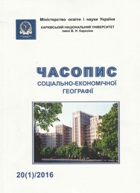National schools of the XX century overseas human geography
Abstract
In the period between two world wars there was a final design of national schools in overseas human geography: German, American, British, French and Soviet. German human geography during the late nineteenth – early twentieth century most experienced revolutionary changes in its methodology, which was connected with the socio-political life of the country at that time. In the 1960s mathematical and statistical methods of social phenomena became particularly popular in the human-geographic studies in theUS. There was a shift toward the analysis of group behavior, the relationship between man and nature that led to the formation of such a trend in science as geography of spatial perception. Among the areas of human geography that developed in theUKin the 1990s it is worth to distinguish the environmental management, geography of life quality, medical geography, regional economic, historical and political geography.
Within the bounds of Soviet region-complex school of economic geography the following industrial concepts of science took shape, such as: economic zoning and complexation; regional planning; geography of industry; geography of agriculture; geography of transport; geography of cities; geography of population and settlement; local economic and geographical studies; historical geography; geography of nature management; social geography; economic and geographic mapping and modeling.
Thus, human geography in foreign countries after the Second World War was largely represented within five subjects: economic, social, cultural, political and historical geography. Among the areas of foreign human geography at the end of the twentieth century it is also worth noting the behavioral geography, cognitive (educational) geography, radical geography, feminist geography, Marxist geography, positivist geography, post-colonial geography, poststructuralist geography, psychoanalytic geography and spatial analysis.
Downloads
References
2. Isachenko, A.G. (1971). Razvitie geograficheskikh idey. M.: Mysl, 416.
3. Saushkin, Yu.G. (1973). Ekonomicheskaya geografiya: istoriya, teoriya, metody, praktika. M.: Mysl, 559.
4. Aleksndrovskaya, O.A. (1972). Frantsuzskaya geograficheskaya shkola kontsa XIX – nachala XX veka. M.: Nauka, 144.
5. Mukitanov, N.K. (1985). Ot Strabona do nashikh dney: evolyutsiya geograficheskikh predstavleniy i idey. M.: Mysl, 305.
6. Zhekulin, V.S. (1989). Vvedenie v geografiyu. L.: Izd-vo LGU, 272.
7. Porosenkov, Yu.V., Porosenkova, N.I. (1991). Istoriya i metodologiya geografii. Voronezh: Izd-vo VGU, 224.
8. Bunge, V. (1967). Teoreticheskaya geografiya. M.: Progress, 280.
9. Battimer, A. (1990). Put v geografiyu. M.: Progress, 440.
10. Hagget, P. (1979). Geografiya: sintez sovremennykh znaniy. M.: Progress, 684.
11. Gettner, A. (1930). Geografiya: yeye istoriya, sushchnost i metody. L., 416.
12. Dzhonston, R.Dzh. (1987). Geografiya i geografy: ocherk razvitiya anglo-amerikanskoy sotsialnoy geografii posle 1945 goda. M.: Progress, 368.
13. Annenkova, V.V., Demko, Dzh.D. (1989). Nauka i iskusstvo geografii: Spektr vzglyadov uchenykh SSSR i SShA. M.: Progress, 200.
14. Pіstun, M.D. (1996). Osnovy teorіi suspіlnoi geografіi. K.: Vyshcha shkola, 230.
15. Moroz, S.A., Onoprіenko, V.І., Bortnyk, S.Yu. (1997). Metodologіya geografіchnoi nauky. K.: Zapovіt, 334.
16. Olіynyk, Ya.B., Stepanenko, A.V. (2000). Vstup do sotsіalnoї geografіi: navchalnyy posіbnyk. K.: Znannya, 204.
17. Shablіy, O.І. (2004). Osnovy zahalnoi suspіlnoi geografіi: pіdruchnyk. Lvіv: VC LNU іmenі І. Franka, 444.
18. Savchuk, І.H. (2004). Osnovnі tendentsіi rozvytku frantsuzkoi geografіi u 70–80-h rokakh XX stolіttya. Ukrain-skyy geografіchnyy zhurnal. K., 3, 74-81.
19. Savchuk, І.H. (2005). Osnovnі tendentsii rozvytku suchasnoi frantsuzkoi suspіlnoi geografіi. Ukrainskyy geografіchnyy zhurnal. K., 1, 31-36.
20. Freeman, A. (1961). Hundred Years of Geography.
21. Shtoyko, P.І. (2000). Ukrainsko-nіmetska spіvpratsya v geografіi: naukovі kontakty S. Rudnytskoho i A. Penka. Nauka ta naukoznavstvo, 1-2, 137-142.
22. Druzhinin, A.G., Shuvalov, V.E. (2010). Teoriya sotsialno-ekonomicheskoy geografii: spektr sovremennykh vzglyadov. Rostov-na-Donu: Izd-vo JuFU.
23. Saushkin, Yu.G. (1976). Geograficheskaya nauka v proshlom, nastoyashchem i budushchem. M.: Prosveshchenie, 529.
24. Ekonomicheskaya i sotsialnaya geografiya v SSSR: istoriya i sovremennoe razvitie (1987). M.: Prosveshhenie, 542.




